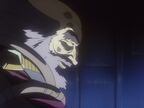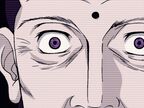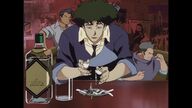Yokote Michiko is the first pole of the Iron Triangle. She is good at digging out the touching moments in life, so that every tender moment she plans is like a grain of sand that suddenly floats from the wind. Chapter 5 Song of the Fallen Angel (Love and Friendship), Chapter 7 Heavy Metal Queen (Love), Chapter 8 Waltz for Venus (Brother and Sister Love), Chapter 16 Black Dog Serenade (Past Friendship), Chapter 24 Hard Luck Woman ( Affectionate) is not so. When expressing the emotions and fetters between people, she is a master of forbearance but not indifference, enthusiastic but not impulsive. When showing the most pleasant episodes in life, she seems to be a childish innocence. Children (this was more fully developed when she wrote the "Laughing Life in the Rainforest") such as Strut of Noragu in episode 2, Blockade in the Darkness in episode 11, her most amazing strokes in episode 17 Mushroom hunter It even worked with director Watanabe to write the script, creating a classic work from fun to visual expression. Who would have thought that Spike's hallucination of walking on the stairs to the gate of heaven would become the title of the final masterpiece of this masterpiece.
If it is said that Yokote is a great general in the screenwriting, then Keiko Nobumoto is undoubtedly a handsome and unmoving talent. In the setting of the whole story background, Hong Kong culture has become an extremely important part. If the best screenwriter in Hong Kong is used as a metaphor, the black humor of Yokote is like Peng Haoxiang, and the focus of Xinben is exactly like Wong Kar-wai - persistent dedication To explain the intellectuals' survival method, to find excuses and proofs for survival. This kind of control that is in line with the spirit of the times has made her a soul figure who manages the whole work. Jupiter Jazz in episodes 12 and 13, and Real folk blues in episodes 25 and 26. Together, these four episodes are almost a movie. The perfect Wang style movie. And the character tone set for Spike in these four episodes is almost the dawn of another "Fallen Angel", or the image of Leslie Cheung in "Evil in the East" - paranoid about the powerless sense of fate, and unforgettable The memory of the past, the confusion about where to go in the future, and the classic lines that make countless literary and artistic young people go crazy. The twisted sky, the desolate desert, the man who abandoned the past, the woman who has always lived in his heart. And the rest of her works, such as 6 episodes of sympathy for the devil and 15 episodes of my funny valentine, are almost an exhibition of leisurely strolls. Sometimes we take memories too seriously, and sometimes we take life too lightly. Therefore, there will always be one or two people who write stories from time to time, first send the memories of the past years to the altar, and then smash them with force.
Sato Dai, although his works are only 3 words, but it is no exaggeration to say that he is the most important side of the iron triangle that constitutes the perfect style of CB. Both Yokote and Nobumoto are extraordinary geniuses, but the inspiration brought by their creations seems to be equally valid if they are placed in works of any era. Only Sato's three unrestrained words are perfectly integrated with the atmosphere of CB's era. Together, in other words, Sato's works are completely born for CB. You may not have heard his name, but every work he participated in is a hallmark benchmark that every anime fan must know. From the smash hit Macross Plus, the two TV versions before and after the sensational Ghost in the Shell. It can be seen that the idea he has been implementing is to talk about the huge proposition of how we can save ourselves after the modernity of human society collapses. The various theoretical frameworks of self-consciousness, morality, rationality, and subject-object relationship proposed by countless philosophical philosophers have been completely dispelled in postmodern society. Where will human beings go? Maybe we can be isolated from the world like HEX and forget the world in a leisurely game (Bohemian Rhapsody in Chapter 15); or we can abandon the machine that produces desire—the body, and store the soul in the vast ocean of information networks ( Chapter 23 Brain Scratch); or use very simple faith and hands to control the destiny that you are fighting for ( Chapter 9 Jumping with ED). When ED stood alone by the sea, waiting for the CB members to come back and keep their promises, this is the most sentimental scene in the whole story-everyone gave up their commitments and beliefs, and we lost our spiritual home of poetic habitation. The Bebop began to take off, and the loneliness and anticipation of human beings surrounded by high technology seemed to drift away with the waves. When ED took out the remote control and flew the Bebop back in front of him, the meaning of existentialism lies in a strong will and free choice. There is no one you can save, except yourself. No one needs your salvation except yourself.
View more about Cowboy Bebop reviews











